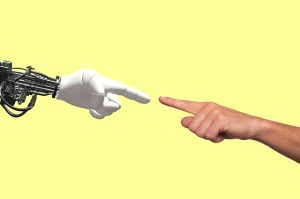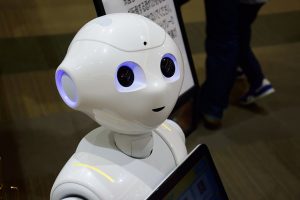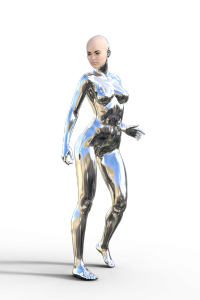Robot Reality
What’s the difference between a Robot and a Human?
The lines are blurred and becoming more so…. the Thesaurus definition of “robot” is both mechanical and human.
- A machine that resembles a human and does mechanical, routine tasks on command.
- A person who acts and responds in a mechanical, routine manner, usually subject to another’s will; automaton.
- Any machine or mechanical device that operates automatically with humanlike skill.
 Robots represent how we view ourselves in the future, and how we identify with our greatest dreams and fears, for humanity. According to the Oxford English Dictionary, a robot is:
Robots represent how we view ourselves in the future, and how we identify with our greatest dreams and fears, for humanity. According to the Oxford English Dictionary, a robot is:
A machine capable of carrying out a complex series of actions automatically, especially one programmable by a computer.
They have been, an inspiration for stories, the obsession of scientists, and have excited inventors for more than 500 years and now the stars of many movies. The current wave includes Star Wars, to Ex Machina, Ghost in the Shell and the latest Guardians of the Galaxy….the future is overrun by robots!
Human connection to the Universe – From the 16th century onwards people were fascinated by the connection between humans and the universe perhaps even earlier but documented evidence shows Astrologers already knew how complex and precise the universe was. They built working models, which explained the orbits and positions of the planets in our solar system and they wondered about the nature of humans and if they were also so complex in their design.
What makes humans tick?
Western doctors started to dissect and make models for the study of the human body, to better understand the organs and systems, which they believed ran in the human so-called ‘clockwork’ body. Already there was an observed correlation between the universe and the human. Something we have to a large extent forgotten today! What we have learnt is a lot about the mechanics and chemistry and biology of being a human which has made it possible to recreate many of the physical and mental functions, such as movement and calculation, observation, speech, even empathy to a certain degree. There are still issues with conscience and possibly morality. Some companies have tight control over what is and are not appropriate in a Robots code of behaviour with regards to children for example.
 robot
robot
[roh-buh t, -bot]
Origin
From the Czech, robota ‘forced labour’.
The term was coined in K. Čapek’s play R.U.R ‘Rossum’s Universal Robots’ (1920).
Man V Machine – The Industrial Revolution saw humans literally working like machines to keep pace with the steam engines, which ran the weaving looms.
Evolution was pushing us in the direction of the automaton, via commerce and manufacturing to mass production and uniformity and branding. Robots themselves are branded nowadays as the large tech companies race to produce the most realistic/able/intelligent/mobile “bot” about. Mechanical humans or Robots are able to perform almost everything now; long gone are the days when robots were only into manufacturing, famously more than half the cars in America are made by robots, the latest humanoid types are designed to teach children, care for the sick and elderly, greet clients, perform customer services, they have developed way beyond the production line…replacing many of our everyday white collar jobs and even skilled work like nursing and teaching along with housework is being tackled.
Some still look like machines because of their functionality the household Rhumba looks like more like a flying saucer than a vacuum cleaner, whilst others are replicas of a human physiology fueled by our desires to create the perfect being and our new knowledge of how human bodies function and advances in technology.
Sex and Robots – Special physical attributes such as gender neutrality may help overcome outdated sexual stereotypes as with REEM who is a designed gender-neutral robot. Many of the humanoid robots are specifically created in a male or female form but by developing more non- specific sex robots it may help erode stereotypes and make for a more inclusive society in the future.
 What will ‘being’ human mean in the future?
What will ‘being’ human mean in the future?
Friendly hyper-intelligent and servile, or sinister and threatening human supremacy! Robots have already had a certain amount of consciousness but how about morality, cultural differences and social levels?
Will we be in the minority with augmented androids and biobots and full on robots running the day to day world, what will life be like if you are a natural human being?
Quick Fix The option to “upgrade” as depicted in “Ghost in the Shell, starring Scarlett Johansson, where the future human with no more than her original brain in a perfect construct body has the ability to dematerialize, hack into any system and perform multi tasks at high speed, all whilst looking amazing! The rest of us are buying replacement organs and getting a rebuild on an organ is available on every street corner
We are still looking for answers to disease, disability, old age amid crumbling health systems, huge health insurance premiums and we want to get special abilities; be superheroes and live forever!!
So is building a bunch of Robots a way to achieve this fantastical future?
YES or NO it’s already happening with all the big corporations and half of Silicon Valley pumping billions into building robots. Humans in the future will be challenged for supremacy in a world where sickness, emotions, and lack of ability are no longer viewed with sympathy. The need to work on upgrading ourselves now or risk becoming obsolete is more obvious than ever. The clock is ticking for mankind and it may be time to wake up!!!!
Also published on Medium.


